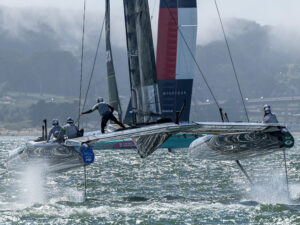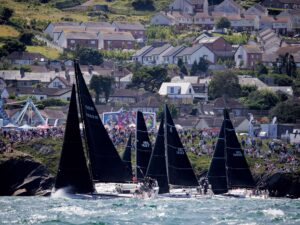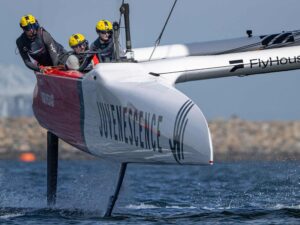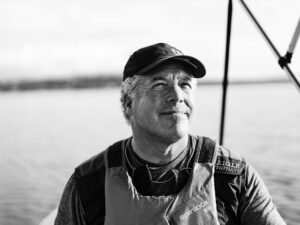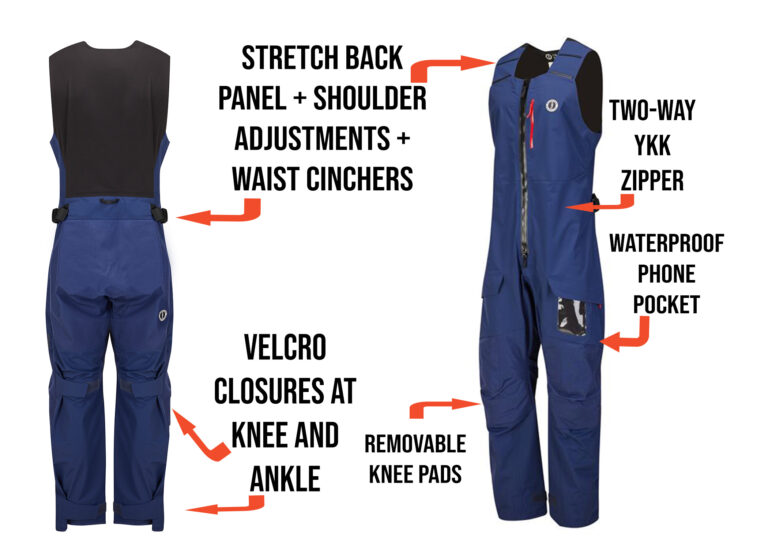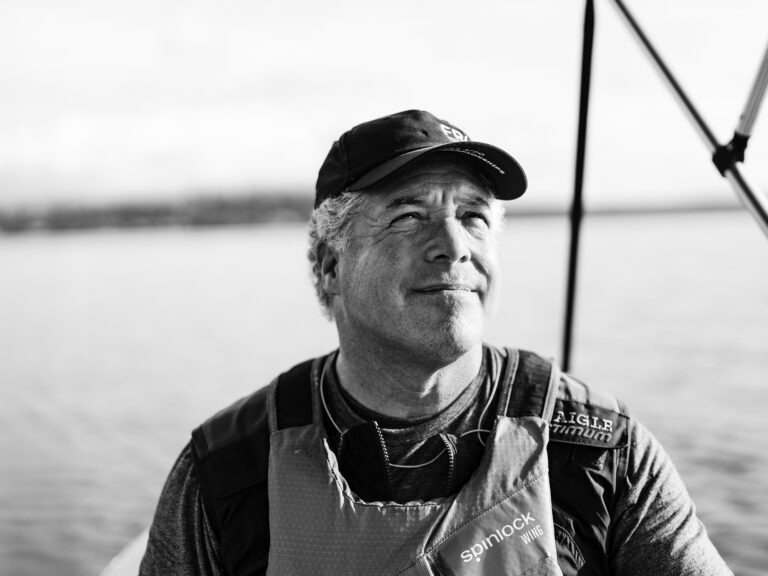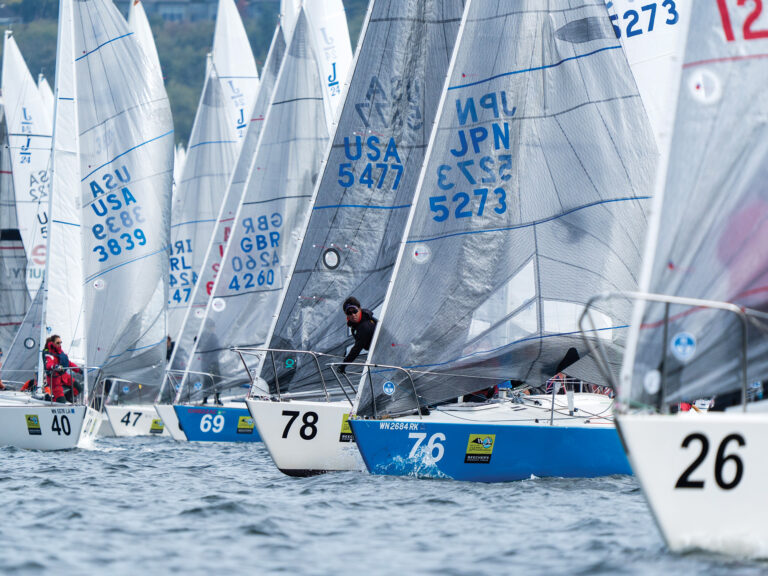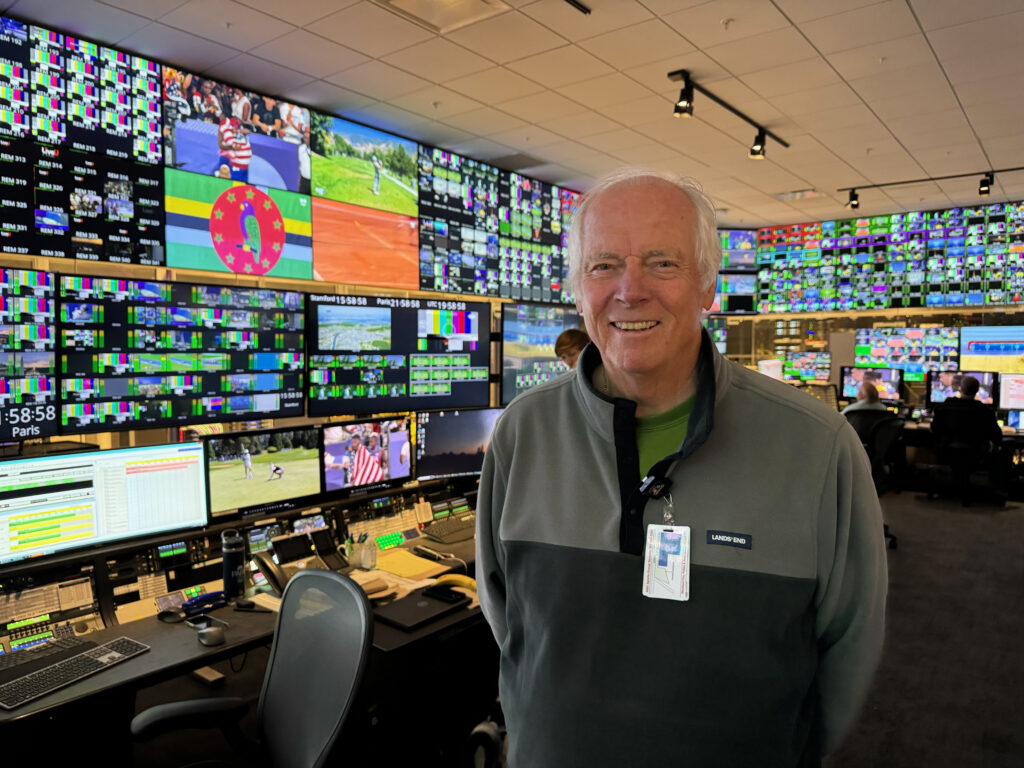
The Olympic Games is the most celebrated sporting event in the world. There are many other great events like World Cup soccer, the Super Bowl or the World Series that attract attention, but the Olympics is unlike any other. Athletes carry their nation’s pride on their shoulders, participating is important and winning a medal is particularly special.
I’ve watched the world’s best sailors reach their zenith at the Games as my interest in Olympic sailing dates to my earliest memories. Since 1988 I’ve covered Olympic sailing for NBC seven times including this year’s regatta, which took place off Marseille, France. I wasn’t located in Marseille; I was hunkered down for weeks at NBC’s sprawling production facility in Stamford, Connecticut, alongside 2,000 others in Stamford producing content from the Games for American audiences.
NBC started “at home” production in 1996 for the Atlanta Olympic Games. Senior Vice President of Engineering, Tim Canary, who is based in Stamford (and keeps a cruising sailboat at a nearby marina) says, “With the advent of high-speed fiber optic links, remote production of major events is prolific and game changing in how sports are produced. Olympic sailing is no different.
“NBC was provided with content from every Olympic venue from Olympic Broadcast Services (OBS) in Paris. That facility was connected to NBC Sports’ Stamford headquarters via transatlantic fiber optic cabling providing 220 Gbps of data throughput. Once the signals are in Stamford, the Engineering and Operations team route the signal to soundproof rooms where talent provides commentary in English to the program.”
I’ve covered a lot of sailing for television, written for print and spoken in front of many audiences and each discipline has its challenges and rewards. Making sense out of the uber-competitive racing and the raw emotions that are inevitably attached some 4,000 miles away from the venue added to the complexity.
Consider these statistics: my role was to keep track of 330 sailors who were racing on 250 boats from 65 nations in 10 classes. Thirty medals were presented to 19 different countries, including one bronze medal to Americans Ian Barrows and Hans Henken in the men’s skiff 49er class. I spent two weeks living in the French time zone, which meant being in my booth in Stamford at 0500 every morning. Unfortunately, wind delays held the start of racing an average of two hours on 12 out of 13 days of scheduled racing.
“Consider these statistics: my role was to keep track of 330 sailors who were racing on 250 boats from 65 nations in 10 classes. Thirty medals were presented to 19 different countries, including one bronze medal to Americans Ian Barrows and Hans Henken in the men’s skiff 49er class. I spent two weeks living in the French time zone, which meant being in my booth in Stamford at 0500 every morning. Unfortunately, wind delays held the start of racing an average of two hours on 12 out of 13 days of scheduled racing.”
—Gary Jobson
Once the program got underway, however, I covered the races of one or two classes each day that extended for three to four hours. Being a solo commentator for many continuous hours is an exhausting mental exercise. The information I had to work with included the live world feed images that were provided by OBS. When racing was delayed, OBS added a graphic that said, “Racing delayed due to weather.”
At times they added a time of day of a possible scheduled start. I had information on a laptop that gave me the scores going into each race, the position and timings after each mark rounding and a link to a biography of each athlete. In preparation for the following day’s races, I partnered with two NBC researchers, Emily Schumacher and Nicholas Bruce, who worked 12-hour shifts, and were able to add information to my list of biographical information.
I also kept on hand a Racing Rules of Sailing booklet, the Sailing Instructions and technical information on each class. I wrote up an extended outline on racing tactics and speed enhancing techniques to help viewers understand the vagaries of racing sailboats. I explained how sailors read the wind, how they deal with overcoming adversity, the role of umpires, and the emotions involved while racing. It is a tricky balance explaining sailing simultaneously to skilled racers and novices.
The OBS was able to include cameras on each racing boat and on the helmets of the kiteboard sailors and windsurfers. A special feature was being able to listen to the sailors that wore microphones. We heard many languages and during starts and tight maneuvers viewers could hear the elevated voices. I tried to be quiet while sailors were talking or yelling. Often the only sound coming from the boats was the wind, waves and heavy breathing.
The production facility was fully engaged throughout the Games covering the 32 summer Olympic sports. The work list included coordinating all 28 announce booths, producing studio shows from control rooms, lots of busy people in edit suites producing features and interviews, research studios, internet reporting, coordinating satellite feeds, feeding everyone with a stocked cafeteria that was open 24 hours, employing janitorial services that kept everything spotless and providing an endless supply of snacks. I found the work force to be focused, friendly and enthused. People cared about their product.
The primary reason racing was postponed was the location of the racecourse close to land. OBS needed the course to be near land to be able to relay their many signals from the camera boats, drones, race boats and helicopters back to the broadcast center. The wind was persistently stronger only 1-2 miles further off the Marseille Marina. Often the classes that raced further offshore were able to get their races completed. Future venues need to consider a suitable location where lack of wind does delay racing.
NBC took great care to give the production team guidance. The fundamental premise what NBC termed the “five rings” of good storytelling:
- Make them care.
- Explain your sport.
- Tell it like it is
- Let the moment happen.
- Emphasize Joy, Excitement, Emotion, and Stories
NBC executives held a series of three online seminars that asked announcers to be “clear and concise, make complex subjects understandable and to be welcoming.” One suggestion I took to heart was to “talk with your audience not to them.” At the completion of the on-line seminars each participant was presented with a diploma. It was a nice touch.
The NBC compound operated with great efficiency that any military commander would appreciate. Almost all workers were housed in local hotels. I stayed 4 miles away in a new hotel just one mile from the Riverside YC. I was able to race in three twilight races during my stay: On two of the days racing was abandoned due to lack of wind, and on the third day we had one good blow. Racing on a friend’s IC37 seemed a world away from the Olympic Games, and yet the sailing on those evenings related perfectly to the races I was watching in Marseille.
At the end of each day, I would write up a report for the NBC Olympics website on the highlights of the day. Luckily, I was able to communicate with people in Marseille and get some helpful insight on the dynamics around the sailing venue. A special moment at the conclusion of racing in each class was the formal medal ceremony. An International Olympic Committee member would present the medals, and a World Sailing board member would issue a diploma in a nifty box. The Paris 2024 music theme played while several hundred spectators watched from a hill overlooking the Mediterranean Sea.
The classes and the formats used for sailing in the Olympic Games seems curious to me. I believe the Games should reflect a sport as it is played around the world. For example, the height of a basketball net is exactly 10 feet for all players whether professional or amateur. In Olympic sailing, five of the 10 classes featured foiling craft. The International Olympic Committee seems focused on presenting sports that are exciting for a younger audience. I’m not convinced foiling achieves that goal.
If Olympic class selection was up to me, this would be my slate of ten sailing disciplines:
One would be Team Racing – three boats per country with mixed crews, a round-robin series followed by an elimination series. Another would be a doublehanded mixed crew long distance race of about 400 miles. Viewers could watch the races 24 hours per day using onboard GPS trackers. There should be men’s and women’s singlehanded classes, men’s and women’s skiff classes, a keelboat mixed crew class, a foiling multihulls class (mixed), a mixed doublehanded class, and continued experimentation with foiling (Formula) kiteboarding.
Olympic sailing is challenging for competitors and fascinating to watch, especially with the 3D graphics, on board cameras, microphones on sailors, aerial images, water level views, compelling personalities and intriguing storylines. When the racing is close, the lead changes are frequent, and competitors give it their best. We can appreciate the dedication required to excel at the top level of the sport. Showcasing sailing on television is great fun and while I was thrilled to be part of it once again, I’m happy to be out of the booth and back on the water.

